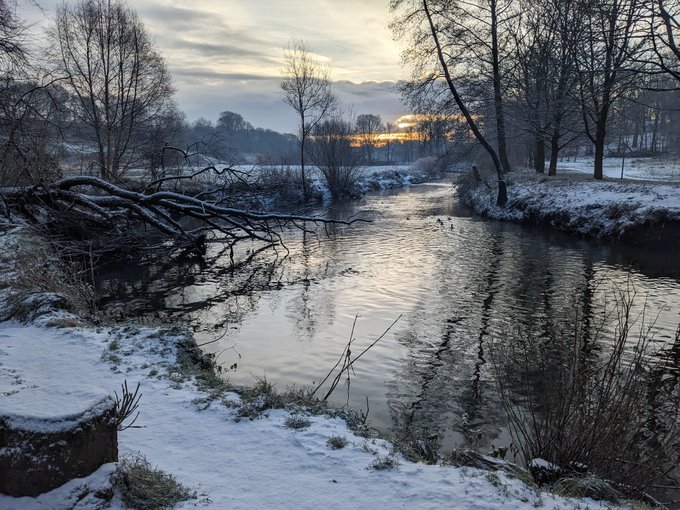The inspiration behind Vivaldi’s composition of his famous Four Seasons appears to be sonnets that he composed himself. In preparation for a Trio Recital (in which we played Piazzolla’s Four Seasons of Buenos Aires), I undertook to make a poetic translation of these lovely sonnets. I share my efforts here.
LA PRIMAVERA – SPRING
Giunt’ è la Primavera e festosetti
La salutan gl’ augei con lieto canto,
E i fonti allo spirar de’ zeffiretti
Con dolce mormorio corrono intanto.
Vengon’ coprendo l’aer di nero amanto
E lampi, e tuoni ad annuntiarla eletti:
Indi tacendo questi, gl’augelletti
Tornan’ di nuovo al lor canoro incanto.
E quindi sul fiorito ameno prato
Al caro mormorio di fronde e piante
Dorme’l caprar col fido can’ à lato.
Di pastoral zampogna al suon festante
Danzan ninfe e pastor nel tetto amato
Di Primavera all’apparir brillante.
Springtime has now arrived, and full of cheer
The birds greet her return with festive song,
And streams caressed by breaths of western breezes
With gentle murmuration flow along.
Casting a dark mantle over heaven,
Come thunder, lightning, harbingers of spring:
They die away to silence, and the songbirds
Take up their tuneful strain once more and sing.
Now in the lovely meadow, filled with flowers,
Under the branches rustling overhead
The goat-herd sleeps, his faithful dog beside him.
Led by the festive sound of rustic bagpipes,
The nymphs and shepherds lightly dance and sing
Beneath the brilliant canopy of spring.
L’ESTATE – SUMMER
Sotto dura staggion dal sole accesa
Langue l’huom, langue’l gregge, ed arde il pino;
Scioglie il cucco la voce, e tosto intesa
Canta la tortorella e’l gardelino.
Zeffiro dolce spira, mà contesa
Muove Borea improviso al suo vicino.
E piange il pastorel, perche sospesa
Teme fiera borasca, e’l suo destino;
Toglie alle membra lasse il suo riposo
Il timore de’ lampi, e tuoni fieri
E de mosche, e mosconi il stuol furioso!
Ah, che pur troppo i suo timor son veri:
Tuona e fulmina il ciel’ e grandinoso
Tronca il capo alle spiche e a’ grani alteri.
In the harsh season, under blazing sun
man languishes, flocks wither, pine-trees burn;
the cuckoo’s voice trails off, while turtledoves
and finches sing impassioned in their turn.
The Zephyr softly stirs, but menacing
the North Wind sweeps it suddenly aside;
the shepherd cries with dread, and hanging on
before the gale, fears for his life and hide.
His limbs, exhausted, are deprived of rest,
alarmed by lightning-bolts and thunderclaps,
and by the flies and gnats in frenzied swarms.
Alas, what’s more, his fears are justified:
the heavens thunder loud with hail-filled rain,
cutting the heads from stalks of wheat and grain.
L’AUTUNNO – AUTUMN
Celebra il vilanel con balli e canti
Del felice raccolto il bel piacere,
E del liquor de Bacco accesi tanti
Finiscono col sonno il lor godere.
Fà ch’ ogn’ uno tralasci e balli e canti
L’aria che temperata dà piacere,
E la staggion ch’ invita tanti e tanti
D’ un dolcissimo sonno al bel godere.
I cacciator alla nov’ alba à caccia
Con corni, schioppi, e cani escono fuore;
Fugge la belva, e seguono la traccia;
Già sbigottita, e lassa al gran rumore
De’ schioppi e cani, ferita minaccia
Languida di fuggir, mà oppressa muore.
The peasants celebrate, with songs and dances,
The pleasure of a harvest wide and deep,
And warmed up thoroughly by Bacchus’ liquor,
Full many end their revelry in sleep.
They all forget their cares, and dance to greet
The air that is with joy and pleasure filled,
The season that holds out to all and sundry
The sweetest slumber with delight instilled.
The hunter at the break of dawn goes hunting,
With horns, and guns, and dogs keen on the trail;
The animal runs off, with them in tow;
In terror and half dead from the commotion
Of guns and dogs, the beast, now wounded, tries
To flee, but harried and exhausted, dies.
L’INVERNO – WINTER
Aggiacciato tremar trà nevi algenti
Al severo spirar d’ orrido vento;
Correr battendo i piedi ogni momento;
E pel soverchio gel batter i denti;
Passar al foco i di quieti e contenti
Mentre la pioggia fuor bagna ben cento,
Caminar sopra il giaccio, e à passo lento
Per timor di cader girsene intenti –
Gir forte sdruzziolar, cader à terra;
Di nuove ir sopra ’l giaccio e correr forte
Sin ch’ il giaccio si rompe, e si disserra.
Sentir uscir dalle ferrate porte
Sirocco, Borea, e tutti i venti in guerra.
Quest’ é ’l verno, mà tal, che gioja apporte.
In icy snow we shiver from the cold,
Stung by the bitter wind with its fierce breath;
We run and stamp our feet over and over,
Our teeth a-chatter, frozen half to death.
Then by the fire we sit relaxed and happy,
While outside rages a torrential squall.
We tread across the ice with careful footsteps,
Paying attention not to slip and fall –
But turn and crash down on the earth and sleet;
Then, rising, hasten on across the ice
In case the surface cracks beneath our feet.
Through bolted doors we hear the winds compete,
Sirocco, North Wind, all the winds at war.
It’s winter! But it brings us joy for sure.
Photo: Ceri Houlbrook

